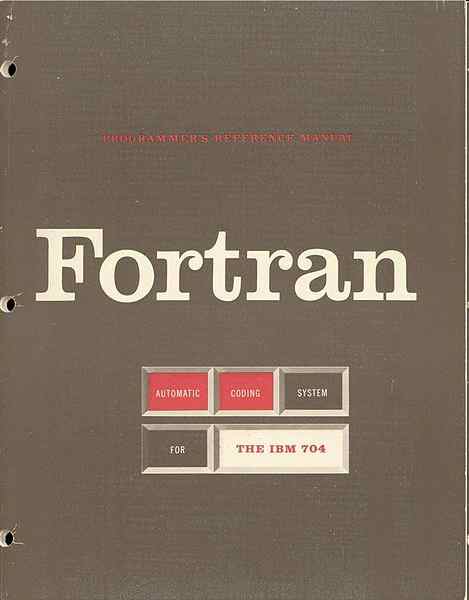| FORTRAN and COBOL Re-enter TIOBE Index |
| Written by Sue Gee | |||
| Friday, 17 May 2024 | |||
|
The TIOBE Index sets out to reflect the relative popularity of computer languages so it comes as something of a surprise to see two languages dating from the 1950's in this month's Top 20. Having broken into the the Top 20 in April 2021 Fortran has continued to rise and has now risen to it's highest ever position at #10.
This is indeed an achievement for a language that was first released in October 1956 with the full title "The IBM Formula Translating System". It was designed specifically for the IBM 704 by a team led by John Backus and was one of the first compiled computer languages. As the first high-level computer language, FORTRAN (its name was all in caps until Fortran 90) influenced many subsequent languages and every single language that compiles an expression owes a debt to Fortran. The headline for this month's report by Paul Jansen on the TIOBE index is: Fortran in the top 10, what is going on?Jansen's explanation points to the fact that there are more than 1,000 hits on Amazon for "Fortran Programming" while languages such as Kotlin and Rust, barely hit 300 books for the same search query. He also explains that Fortran is still evolving with the new ISO Fortran 2023 definition published less than half a year ago. He goes on: "The main reason for Fortran's resurrection is the growing importance of numerical/mathematical computing. Despite lots of competitors in this field, Fortran has its reason for existence. Let's briefly check the competition out. Python: choice number one, but slow, MATLAB: very easy to use for mathematical computation but it comes with expensive licenses, C/C++: mainstream and fast, but they have no native mathematical computation support, R: very similar to Python, but less popular and slow, Julia: the rising new kid on the block, but not mature yet. And in this jungle of languages, Fortran appears to be fast, having native mathematical computation support, mature, and free of charge. Silently, slowly but surely, Fortran gains ground. It is surprising but undeniable." The other legacy language that is on the rise in the TIOBE index is COBOL. We noticed it re-enter the Top 20 in January 2024 and, having dropped out in the interim, it is there again this month: Devised in 1959 based on the work of a committee made up of computer users and manufacturers, COBOL, standing for COmmon Business-Oriented Language, was created to address the need for a standardized programming language that could be used to develop business applications across different mainframe computers. We have frequently commented on its resilience as a language that is still widely used in legacy systems that underpin critical business operations in sectors such as banking, insurance, and healthcare. Its highest position in the TIOBE index was #8 in 2001 and while you might expect it to have exited the stage long ago, a 2022 survey commissioned by COBOL vendor Micro Focus found that organizations are still hanging on to their COBOL code, and that the COBOL application footprint is in fact growing rather than shrinking. So we have two legacy languages in the TIOBE Top 20 for rather different reasons - COBOL skills are still needed to sustain vital legacy (or should that be out-dated) systems. Fortran, on the other hand, has a role to play at the cutting edge of scientific research and can be expected to have an expanding role in its "Modern" incarnation.
More InformationRelated ArticlesFortran Re-enters TIOBE Index Top 20 FORTRAN - A Breakthrough Computer Language Fortran At 60 Still Going Strong John Backus - the Father of Fortran History of Computer Languages - the classical decade, 1950s COBOL Market Three Times Larger Than Thought COBOL Turns 60, Still Won't Die To be informed about new articles on I Programmer, sign up for our weekly newsletter, subscribe to the RSS feed and follow us on Twitter, Facebook or Linkedin.
Comments
or email your comment to: comments@i-programmer.info |
|||
| Last Updated ( Friday, 27 September 2024 ) |




